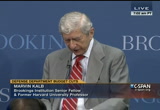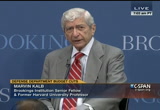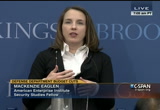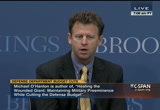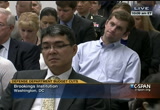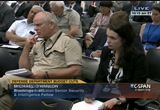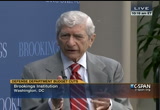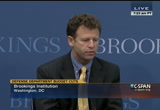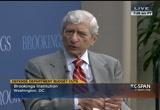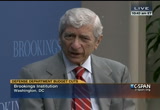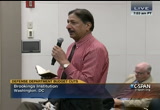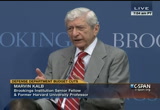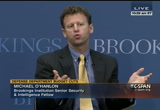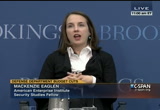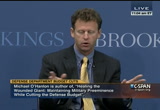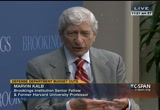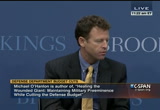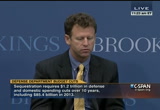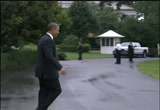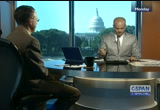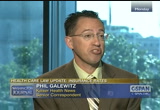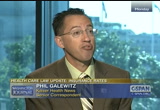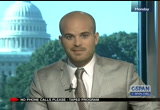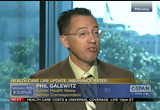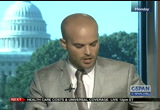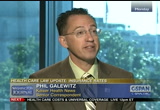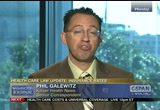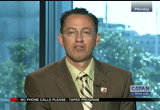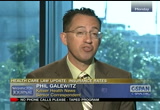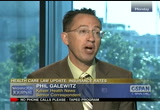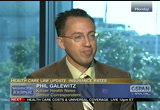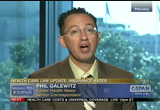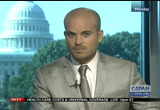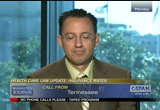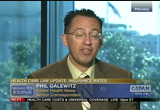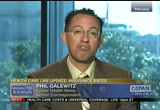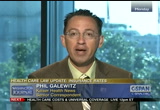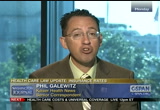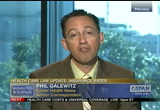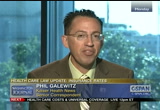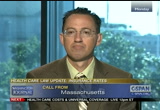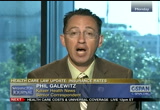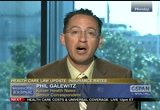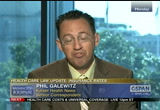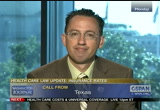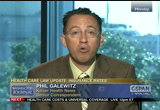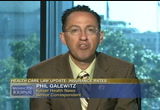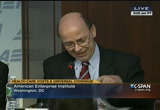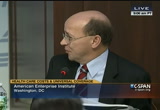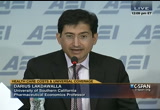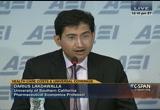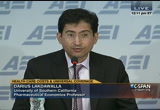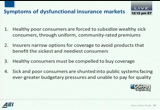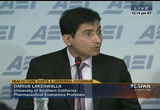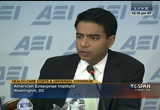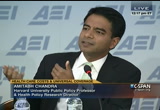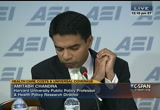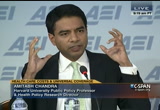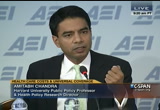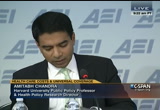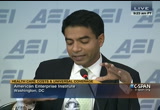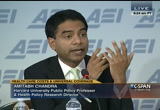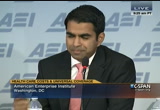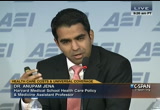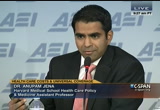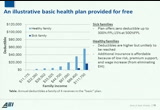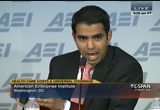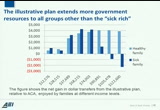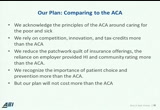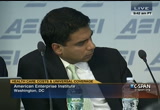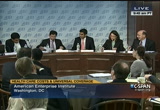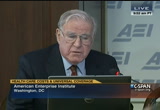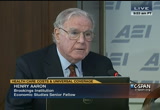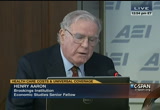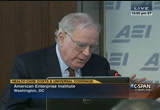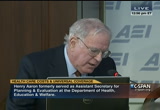tv Public Affairs CSPAN August 6, 2013 10:00am-1:01pm EDT
10:00 am
[captioning performed by national captioning institute] [captions copyright national cable satellite corp. 2013] >> we are live at the brookings sister this morning. 400 $87 billion in cuts for the 2011 budget control. recently chuck hagel said the military is considering force reductions and cutting benefits to meet the lower spending levels. there is live coverage here and c-span.
10:01 am
10:02 am
this is dissecting the pentagon strategic choices and management review. i am marvin calvin. i am a senior advisor to the center for crisis reporting which is located just next door. august 2011 which is only two years ago congress passed and the president signed into law a legislative monstrosity called the budget control act. it was a way of doing something when nothing seemed worse. at least at that time. a joint committee was set up to control the spiraling deficit. that if were -- warned they fail to come up with a solution sequestration would automatically although. these cuts have now begun. was already
10:03 am
prepared to cut 150 billion dollars over the next 10 years. $500stration would require billion in cuts over the next 10 years. warnedek check hagel that cut of that magnitude would not only affect entitlement such as salary, likeng, education and the but it would since readiness and capability. itthe u.s. had been ready is necessary to fight two wars at the same time with these cuts. that would no longer seem to be possible. what to do? effectiveked highly budgetary experts to explain
10:04 am
reality and options to us. a resident fellow at the american enterprise institute's and if i got this right, during the last presidential campaign she helped governor romney. 's loss should in no way be extract to mckinsey. the other is a senior fellow here. recently our panelists call off third and op-ed "urging congress to reverse sequestration. why don't we start with you. then we will go on to mike and i will ask you a questions and we will finish at 11:30.
10:05 am
>> thank you for moderating. it is a pleasure to be here. that's only do we recently author the op-ed in the wall street journal about some of , we met with secretary hagel at a meeting last week. we talked about some of what was discussed during that conversation. i think you have set the ground very well. sequesters not the starting point. so much in washington feels like we are always starting at square one. this is the fourth year of budget cuts. the job done has been well under way. there were a series of capabilities ever since. there has almost been roughly one dollar -- wintry dollars taken out of this.
10:06 am
they are constantly banging the drum. that is why you hear them talk endlessly about how damaging sequestration is. this is not the first dollar of defense cuts nor is it the first capability or capacity that is being unwound. a lot of the things we will talk about our overdue. so many of the choices that the pentagon had recently laid out, i think that should have been under consideration for years ago. not to say that a lot of the were not of value or utility. this is not their first efficiency journal.
10:07 am
there were a lot of things done rightly and wrongly. i'm not sure the lessons learned have plugged in. what we have now is the defense department and congress that continues to have to go back to the same money and priorities for dod every year. we're doing this on an annual basis. we are are doing it piecemeal. it is chipping away at the cuts as opposed to big richer strategic planning, inking about this. we really do have to live with this. how do we handle this for 10 years? 2013. what we saw in we're going to start to talk about serious change in planning. >> pick it up. by the way, mckinsey cannot be
10:08 am
lamed by governor romney's loss. -- has them polite enough has been polite net -- polite enough to not remind us that she is from georgia. this has been very well framed. some of the additional budget cuts that are now being considered i think are ok. not have the exact same view. i do not want to suggest that everything i say she would endorse. we think there are room for efficiencies. some of them are that you can congres accomplish then. they are worth doing. in the briefing that we heard last week from secretary hagel and his team, which develop some of the ideas that were also expressed by deputy secretary
10:09 am
carter. we saw an estimate that perhaps $40 billion could be saved over 10 years for new efficiencies. that is on top of the other efficiencies that were already identified as part of other budget cuts reviews. it is worth pointing out, and congress is not yet authorized many of those previous efficiency. we are even deeper in the hole than we thought. we are not going to have to persuade congress to change their minds or find other ways to save comparable amount of money. these are authorized. some of these efficiencies could save somewhere around $40 billion over 10 years. every time he asked the pentagon to try harder and go deeper they will probably find another 5 billion or 10 billion there. on balance there's never going cuts.be and and all
10:10 am
cuts. the end of all 40 billion. let's say we can do that. then there is another examination of possible savings which we wrote about in this wall street journal op-ed 10 days ago. they have to do with things like reductions in certain elements of military compensation or reductions. easy.are not they are not inherently desirable. [cell phone ringing] cut the that we should compensation is not proper phrasing. we would like to make sure that every possible benefit that can be proposed that the received. certainly wounded warriors. certainly the families of deployed soldiers.
10:11 am
certainly troops trying to get a g.i. bill so they can transition to the or. people deserve compensation that is not tendered or compensate -- hindered or compromise. an example would be the prevalence of commissaries. s andhave plenty of walmart others. they are not trivially easy. they are cutting back on the compensation or at least the rate of growth of compensation for our volunteer force that has done so much on behalf of all the rest of us over the last 12 years and before. ,ou add up all of those savings which are more or less along the lines of what i would agree with an similar to the ideas that we had in our op ed, that
10:12 am
is another $85 billion in savings. if you add those, we are up to about $105 billion in additional 10-year savings. the good news it is almost the amount the president is proposing to save over his tenure latest budget plan. we do not have to make a lot of cuts into military muscle. there is room for some cutting. upmy recent book, i wound advocating about $200 billion in 10 year savings. i was prepared to recommend certain specific weapons programs. we all are going to have different takes on what the right number of army divisions over grades or joint fighters we should purchase. my take was that in addition to this hundred and 20 or so maybe another 75 or $100 billion from cutting muscle.
10:13 am
the pentagon seems to have arrived in a different place, in a similar place. then i had to keep going. this is not a criticism. our skimmerreview -- or skimmer it is called by people who do not like having again from the pentagon budget. the idea here is that we're going to have to look for ways to save this 500 billion dollars. sequestration is currently the law of the land. above and beyond the kinds of changes i have artie mentioned, then some modest tweaks to capability. they did a couple of things i really do not like. i do not sure -- i'm not sure the authors like it either. to downsize the u.s. army quite a bit more than is artie being planned.
10:14 am
and the way for other discussion topics. let me give you a sense of what is being considered. the u.s. army right now is just over half a million active-duty soldiers. it has grown up to about 560,000 during the peak of the iraq and afghanistan wars. we also mobilize a national guardsman. all of these numbers are quite modest compared to the 1980s, the cold war. they had 800,000 were says. u.s.ve had a much larger army totals during korea, vietnam, world war ii. being down was a girl from the clinton years and from secretary rumsfeld's early thinking. it was not huge. it did not reverse because of the end of the cold war. now we are planning to go down
10:15 am
to basically where they had been. the skimmer is envisioning reductions of maybe 420,000 are rher. i think this is a bad idea. problem i have with the want.stration as they not want to do these counterinsurgency missions. this is the largest sentiment we had after vietnam for sentimental reasons. tot sentiment when taken excess leads you unprepared.
10:16 am
you might have to do a counterinsurgency whether you like it or not. there is the old saying that you may not have interest in war but it may have an interest in you. we may not have an interest anymore and counterinsurgency but what cap ends when not just but it begsmired even lebanon and jordan. the onlyened when atential way out may see trustee. i could go on with hypothetical examples. they are going to sound a little crazy. they are going to as crazy in 2000 if i had mentioned afghanistan as the source of the 9/11 attack. you cannot always anticipate where war has sprung up. we have a lot more to discuss. the kind of cuts to the u.s. army at least being considered within the skimmer process i
10:17 am
think are highly imprudent and leave us catching on to the latest fad in warfare. that we canretend decide in washington that we will never do it can. we made that kind of mistake before as a country. >> thank you very much. let me ask all of you a quick question. do you think by the end of this year congress will have acted on sequestration specifically for the military? >> they would have acted separately in each chamber. there will not be any change to the law. >> we can realistically look forward to the implementation of sequestration. >> i fear she may be right. if you look at the 2014 budget, the cuts that would be required by sequestration are so harsh for that year and there is no
10:18 am
way to facing realistically, it is even a worse debacle then sequestration over the 10-year horizon. it dwarfs even what we going through this summer. if compounds what we are going through this summer when almost all the -- almost half the airports and we are not fixing the stuff we need to i think ve ifess may ultimately sa say $52 billion need to be softened. they do not do anything that is fundamentally changing the basic logic of sequestration. just becauseble the specter of sequestration next year so horrible for the armed forces. >> if that be the case, we're working with the reality of very massive cuts. you have given us a hint about the practical effect. to fulfilly exist
10:19 am
the desires and the strategic aims of the country. as i mentioned earlier, we have lived in this country for a long time with the belief that we will fight two wars at the same time. i assume he mean the rack and afghanistan. and afghanistan. that did not take into account that there could be an outbreak of hostility in korea which would involve the united states momentarily. if we look at the strategy now and we look at the amount of money that is going to be available to be spent, what do you think will be the of that on the strategy itself? what would you recommend to the president? what would you recommend that he begin to consider as a change
10:20 am
in the strategic aims of the u.s. to conform to the economic reality? >> i would not want to advocate that. m artie disappointed that they have officially moved on from the outstanding contract. this has been -- i am already disappointed that they have officially moved on from the outstanding contract. our planning are formally changing quietly to move away from the to wawo war simultaneos capability. >> where are we going now? >> the department is sticking by its guidance. the guidance last january. because the rebound to asia. an increasingy emphasis on asia and to hold this in the middle east.
10:21 am
at the expense of capability in other regions of the world. the military is shrinking. we do not have a choice. have a single ship in southern command. you cannot say it is not eurozone. it is a relatively sound strategy. the independent panel called for qdr independent panel in 2010 which was a stress test for obama's first .efense strategy some argue the bush administration started this. it is not zero-sum. i do not see any scenario where the congress could continue.
10:22 am
what you are saying is that economically we will not be able to do that? >> their artie moving away from that in realistic time. the previous position is to not break the strategy. we also heard this reiterated at the pentagon last week. move it as were to is. a quarter trillion in defense of budget cuts proposal by senator patty murray, larger than the president in his latest budget process. the would have been strategy. the full sequester would have stopped it. based on the double and triple whammy hold, we are not just
10:23 am
talking sequester dollars anymore. we are talking about readiness own tab.t is also its it is under which a talk about later. all of this combined me that any scenario is that a minimum bending strategy. one.nk it is a sound i do not know how you can keep it. >> you have written that you go from two wars at the same time concept to one war plus two. i assume you mean smaller engagements. could you spell us out -- that out for us? >> i think it is good you are focusing on the strategic choices as we think about different levels. otherwise it seems like just moving around. there is room for debate even within the budget. it is not as if all wars came
10:24 am
in the same cookie-cutter shape. the basic logic is that we thought we would have to fight iraq and north korea at the same time. it turned out to be a rock and afghanistan. you can debate whether you had to do both but we did do both. our military was too small. we were a little bit off in our calculations. that is why secretary gates ultimately had to increase the size of the army and marine corps. in the 2010 ledger numeral 2010 defensew -- review, they solved it to have it be definitive immediately. this is a 20 year old, if not more. whether there is room for the
10:25 am
second one to be a little more gradual and a little less definitive. in 2010 president obama started to move a little bit away from that robust rhetorical emphasis. saddam hussein was gone. even though iraq is still very turbulent it is much more likely to be in overland invasion fed to it measures. iran is still there. it is also relatively unlikely to be an invasion threat. it could eat a lot of other threats to the invasion. that was 2010. in 2012 this guidance we are referring to, the january guidance softened a little further and talked about the second war not needing to be thought of as an all out war at all. there is still the notion that ay have to punish an aggressor.
10:26 am
there is some semantics here. >> it is like playing with reality. >> a little bit. i would support the logic to that point. we did have to shift more of our with chinads our war and also toward iran. these are both unlikely to be classic big land wars. they could be more maritime or a tear, cyber, special oriented complex. i think was ok. seeing with thesayin sequestration specter is the possibility of going down to something like one war and nothing else. maybe you can still do korea, maybe. this is often not how the world works. we all know that our good friend
10:27 am
mark just let things to try to this.ate in the unlikely event that he succeeds that could be an international implementation force backstopped by american troops to make that successful. they hit one of our embassies one place and know me call a truce and go back to life as normal. that is pretty -- and then me == call a truce and then we go back to normal. that is pretty optimistic. there are a number of scenarios. that is why i talk about one plus two. you should be able to do one all out war and to simultaneous smaller missions. hopefully their multilateral. they could be long-lasting. that is where i come up with an
10:28 am
420.that should be around rldwhat is the part of the wor that the united states military must be focused on more than any other? it is the moment middle east. strategically, the defense department has to do both. they have to think about the world as it is in this very moment and reality. what is happening? breaking out in crises everywhere. 20n think of buying 10 or years. they need to do both. >> presumably they are. >> they are. if you look at the example the budget request from last year, the immediate concern is the middle east.
10:29 am
i think that is exactly right. >> that means what? break that down. mike spoke about iran. one could think about syria. want to think about the huge problem in egypt. there is everything going on in north africa. what the middle east mean to us now? what it means to us is probably debatable. >> you military experts. >> let me say quickly for dod .ight now it is iran looking at the capabilities that might be required to deter flict breaking out or miscalculating in international waters or prevailing in some type of military efforts, whether we are supporting someone else are undertaking
10:30 am
our own. there are many other things happening. to a special forces and counterterrorism missions. that is certainly not what we are limited to. there is ongoing planning. , that is anw example. >> i'm trying to get at this. i have a feeling we are talking theory, not necessarily reality. think about it. you have both spoken of iran. if the united states in the next year or three decide that and must take on iran and the nuclear program and korea the mteof at is not small operation. korea is big-time. we arty have troops in south korea. theidea of one plus two, two,of whittling down
10:31 am
sounds to me as if it is not related to reality. united states has to be in a position whether it is 1 plus two of taking on any combination of military challenges. can the united states do that realistically and might of what is happening in the american economy? in light of what is happening in american politics. in light of the fact of sequestration. being having strategy determined by people up on the hill who may not have a clue as to what strategy is all about. is that right? you are framing these very starkly. it is our national security after all. we have to get away from a theoretical discussion. i threw around numbers. if you ask me why we have to be able to do to smaller missions
10:32 am
at the same time, i would say typically because that is the area we are doing. the expectation is that we will keep 10 or 15,000 u.s. troops there for a number of years. middle east peace is president obama possible. i do not know what kind of force may stop it. probably one or two brigades. againstability of war iran is probably in the 30% range. hopefully not 50%. if we do wind up in that kind of a strike we should remember we do not always get to decide when wars and. you may get to decide when you start them. you usually do not get to decide when they are over. having to show up on the persian area is a pretty plausible notion. when he thinks are the smaller missions we are likely to do two
10:33 am
and maybe three at a time. i am not even talked about my preference which will be or an ultimate bosnia style solution in syria where the u.s. deployed them there as part of an ultimate peace deal and probably not within reach this year. if anything i've understated the requirements. 450,000 troops in the active- is small.army i think it is not throwing him teen piles of cash at an already bloated pentagon. >> mike talked about the army and it affect. what about the navy and the air force? whatou give us some sense if these cuts take place will happen to the u.s. navy in the
10:34 am
u.s. air force? >> sure. the consequences are pretty stark for both of these services. of course in the marine corps as well. it was framed to us as part of thatentagon presentation this is one of our forces globally. they are out there ready to respond. that is leaving out the air force that has just evacuated personnel last night from u.s. citizens from yemen and other places. the marine corps does have that significant role. we taught navy cut i will include them as well. consequential.c let me start with the air force. the air force is the second biggest loser under the budget debate and not strategic. for theearly outlined budget. this is not strategic driven.
10:35 am
we can say that upfront. i do do not think anyone disputes it anymore. getting a lot of attention and rightly so. michael is so eloquent and talking about why that is a problem. the security of defense outlined that he is going to change the so-called golden ratio of the service budget shares, the historical amounts. the implication there was that the navy is the relative winner but no one is the winner because everyone is coming down. the army is the most significant and heavy but the air force is a close second. it is onriefing tactical fighting forces and on some lift forces. there is certainly more that was not mentioned as part of the briefing that requires a significant chunk of our forces.
10:36 am
these are old and it should be considered anyway. , and youneed numbers really do need them, that could become a really worrisome outcome. ,f you consider your air force your swing for us, global force, which i do this is disconcerting. these are the kinds of things you will give up. the air capabilities, the sarah. secretary talked about these groups. all of the associated shifts -- >> two or three cut down from where we are now? >> correct. an 11 carrier is force with a waiver of one.
10:37 am
>> we have come down to eight is the sequestration went through. >> that is the prediction. tellme and a practical way how that that may end up hurting me united states -- twelell in a practical way how that may end up hurting the united states. global lily pads we can take anywhere that is water. we can use it to use whatever we need to do. primarily they are a deterrent force. they are a fourth multiplier. the navy does not have a choice. cannot recall who mentioned it. if you look at the u.s. navy
10:38 am
budget and composition, 60 of the navy touches something that has to do with the aircraft carrier. that is what goes into it, the ships that say with it, etc. you can see the damage that would be done to our world wide forces. i reference the marine corps. we would be giving up a lot. we saw this partly in iraq. the inability for us to in any sort of military service for the long term would have ambushed with a lot of intelligence. in the region we would have had naval support as well. we get uave itupu up to iran as part of the deal.
10:39 am
ave itupu up to iran as part of the deal. >> help us out a bit. to whatu like to add she is already given us? >> great points. they're looking to do things differently. there's only so far this can possibly go. i will look at why the cuts that she alluded to would be too extreme. was're lookinglast spring a sen about to hit. they decided not to send a second carrier to the gulf. a lot was made of that. for the sailors who were about to go, it is unfortunate they were asked to jen up and then stand down. i do not worry that much about what it did for the country. i do not think it was that important to have two carriers to the gulf all the time. fighting iran at
10:40 am
could be. an idea that i am trying to we have thisnce rising threat of iran in the broader middle east and a lot of other countries agree with us that it is a threat, i think we can be a little less skittish about putting combat aircraft on land in the middle east. historically we have not wanted to associate ourselves with the autocracies of the gulf cooperation council and the arabian peninsula. they have not always wanted to associate themselves. we did not like it when our airbases got attacked. we agreed after the invasion in particular just to scale back. we still have some airbases in the region. cuts are elsewhere. we did not have a lot of combat aircraft. we could change that. get them to host 50 fighter debt each. that way you do not put any eggs
10:41 am
all in one basket. if you do that you do not need light as many characterarriers. the carriers need to be cycled in and out. you wind up needing five in the forest uses saying one. it is a great way to have combat airpower if you do not know where you're going to have to operate and you need flexibility. that is an example of where i would be able to see this in one ship. maybe even two. on the other hand, china is adding $10 billion a year to its military budget each and every year. i do not expect us to fight china. sustain a we have to very robust presence. i would like to see us be able to ramp up our carrier presence in the pacific.
10:42 am
that has been a focus of secretary panetta and secretary where the rebalancing to the asia pacific. we are trying put 60% in the pacific. he used to be more like 50%. you not going to achieve the desired effect. i think the navy can shrink a little. if you put these kind of ideas on the table and you are breaking a lot of china to do what i said, this is how you get to maybe $200 billion in additional 10 year savings. sequestration to me as just a bridge too far. >> i think i'm asking this as much for myself as everyone in the room. a little bitg us of the flavor it is to figure these things out now. the unitedtic way,
10:43 am
states is hurting economically. you have to cut the budget. you have to cut the pentagon budget. there are two questions that come to mind. one is what about the rest of the american budget, not just the military side? we seem to be a sort more with the military side of the budget and complaining about cut their family are about the rest of the budget. i appreciate military needs and all of that. is there somebody in your experience at the military side who was saying we are only part of this problem and we have to be aware of everything else in american society that is going to be affected by sequestration? do you even hear the in your discussions? i have heard it from the secretary and the last secretary of defense a lot. even the predecessor talked
10:44 am
about security efforts beyond dod. there is a great concern at a political level about this. to be fair, reason so much is on this and particular is there has these efforts. they are putting in more dollars relative to its own size than it is the largest. ands only fair and my mind certainly as unique and turned its constitutional mandate. unique but it ise reasonable to have an emphasis on the defense department in
10:45 am
particular. this is the fourth year of budget cuts. almost all of these agencies are coming off a budget wave of good news. bill andhe stimulus the first year of this administration. that was a plus of every agency defense. that is when the budget started going down. i will defend this for a moment. i am not seeking to criticize the pentagon. i'm trying to put it into a context involving the entire budget and all of the needs of the united states, not just the military needs. if you turn it around and say that we live in an extremely turbulent world and maybe we would like, after it in a stan -- after afghanistan and iraq, to pull back. and do nationbuilding at home.
10:46 am
are we capable of doing nationbuilding at home in a world that remains as turbulent as it is? the am going to cite opportunity i had recently to write andh dad petraeus. one wasthis week and earlier this year in the washington post. we have tried to argue that these deficit deals that have been proposed would be wonderful to have an many ways. they are not essential. what you need to do, given that america's economy has so much promise, what you need to do is tip the curve on how we are increasing the debt. if we lower our expectations a little we can wind up in a reasonable place for the next five or 10 years. long-term entitlement is a big challenge. our colleagues have written eloquently about this. if you had aterm,
10:47 am
modest increase in either income tax rates or a modest cap on deductions the way mitt romney was proposing last year and you had a couple percent change in the cost-of-living adjustment for social security for social security recipients that would accumulate over time, you could achieve half the cuts in the discretionary accounts that sequestration would impose. , you havethat prevented the debt from getting bigger relative to the size of the economy. then all the things we have going for us, our energy resolution, the advanced manufacturing, the gradual recovery of the real estate markets. all of these things can kick in. washington does not need to see itself as a location of this great showdown of loaded government versus liberty and the tea party.
10:48 am
we do not have to be quite that melodramatic about our role in washington. it is an important role. the private economy and american people will do a lot of the heavy lift and based on forces that are already out there if we can just get the darn debt to start growing relative to the size of the economy. you can actually live with deficits in the range of $300 billion a year or $400 billion a year. we sometimes make the problem seems so impossibly hard. it is not impossibly hard. well within these we can tip the deck curve to the point where relative to the size of the economy it is no longer growing, it may be shrinking a little, and let these other positive rings happening take over. >> i have no objection. let's turn to you all. if you have questions, please raise your hand. ask your question.
10:49 am
please, no speeches. i see a number of people in uniform. i will try to get to them as well. >> they added a second that beatty -- deputy of stay. they have a small cabinet department. secretary hagel has spoken of an enforcer to help make sure the efficiency cuts and other things are done. would it make sense for the defense department to establish the second deputy to establish the resources? >> you have a smile on your face. do you have an answer? >> thank you. a couple of problems. yes and no. i am always loath to grow
10:50 am
bureaucracy and add new positions without them taking away somewhere else or figuring at the defense department, specifically this appointment class. the department of defense has made recent changes to bring in a management officer. thingseagues and other have faced off on that question. he makes an eloquent case that there have been times where we have had two deputies and works very well. i would argue if you are current, and there's no way to argue without sounding like a cruise is a of the man and job, but if the current -- like a criticism of the man in job,, executed frombe his office maybe we can expand this elsewhere.
10:51 am
int we have seen before now , and i'mdecade plus talking about one of my colleagues. we have seen a lot of policy heavy and this is with people with backgrounds. i do not like that. that is what i do not like. who is prefer somebody coming in from the outside, someone who has been in the industry or run a business successfully or who has overseen management. they have had this model for the defense department in the past. this model has proven that it works. i am not knocking the guys who are in a job. perhaps this was the right way to do it. is wewe are right now need a strong deputy. that is more important than the secretary of defense portion right now.
10:52 am
the idea of this market being a bloated leas, all kind of dough is being spent unnecessarily. do you think that would actually help? >> i think i come down where mckenzie does. supposed to do this. i think ash carter is doing a good part.- there is no clear budget ahead. it is not doing as good of a job as past congresses. this congress has been unwilling to do it. it is time to ask congress to step up its. >> thank you. my question is virtually
10:53 am
10:54 am
are we making more friends or enemies? what are we not doing? you are raising a very good question. to me it is a fundamental question. the military is there to implement a policy. mike was alluding to this a moment ago. i think he was being too diplomatic. it is not just a matter of the people who put the budget together. it is the people who run the government and have to run the strategy. reallyve to perform money. in many ways it has. now it is operating in a world with uncertainty.
10:55 am
that is a conflict obvious and not easily result -- resolved. >> the power searcher is often this debate. ofense policy is the child a parent call foreign-policy. that is how it is opposed to work and it has not worked that way at all. we seeing this coalescing of the debates. what we're really talking about that are foreign-policy issues. meaningfulhaving a debate. it is being done so poorly and inefficiently. >> from the back. yes, please, right here. thank you very much. it is important to note that
10:56 am
themer is not something administration necessarily wanted to do. it is a cumulative effect that is having a real impact. it is sequestration that is the problem now. if you look at structure levels below 450,000 for the army or a cut to the navy flow, it is not something the administration is interested in doing. when secretary hagel made his presentation the other day, he had this interesting strategic choice between capacity and capability. i would like you to talk about that a little bit. capacity is about structure. capability is about .odernization and at the edge obviously, you're not going to
10:57 am
choose one path or the other. , could youtrategy look at capability and that choice and tell us? thank you very much for that question. the administration is not enthusiastic about these additional cuts. place where i was having a slight difference with them was almost more tone. they suggested that cutting the army down to the low 400s would follow the logic of the defense strategic guidance from last year. i do want to challenge that guidance. i think the notion that we can is aude this to be over little bit of a historical way it thinking about war. with the issue modernization and capacity versus capability,
10:58 am
there are so many different angles to take. let me take our joint strike fighter. the joint strike fighter. it has had trouble. better.ing i am a fan. i am not sure we need 2000 -- 2500. replacezed largely to structure. not quite the more or less. i think it should be sizemore for a high end brett. there are certain places in the world. we flew them over a rock for a dozen of years army did not have any problems problems with aircraft getting shot down. there's always an extra margin of the. is it worth $100 billion to the country? what i have tried to lay out in my own writing and why i
10:59 am
reasonable room exist is scaling back the joint strike fighter to something that in my eyes would be roughly half the size. that would be toward high-end efficiency. possibly some strikes against iran or north korea. air forceyour structure to the extent you need to keep most of it with a greater combination of existing fourth-generation planes. or you refurbish the ones you got. he may be leaning to unmanned -- you may be leaning to unmanned systems. if you do that you do not save cap the budget. you may save 20, 25%. you still wind up with far and away the best combat force that the world will see for the next- generation. that is the way to strike a balance.
11:00 am
you you start doing cuts wind up with this kind of a choice. army of lessr an than 400,000. obviously, there are other ways you could do it, to i do not think we should live with those choices. i think we can cut a couple hundred alien dollars in the plan the on what was in last what obama is proposing, but sequestration is 2-d. >> i love the question because it is the question,. what we should talk about and continue to focus on, is strategic debate. your question is now this is where we are and where do we go from here. two problems with the capability choice that the secretary outlined, and it is
11:01 am
pretty stark. it indoors the fact that capacity is in part a function of capability. leaving that aside, it presents a binary choice for policymakers as if those were the only two. i have a problem with that. something not being debated enough is the department of defense's choice to maintain theiness at all costs, portfolio part of the defense portfolio. let's put aside if that is good or bad. let's talk about that that is an option. the leadership claims there is no constituency -- and there is a budget and the departments reflect that. it is a very expensive proposition. it is not that it is just expensive, but it is a relative that of being, meaning chairman of the joint chiefs said this is the most ready
11:02 am
military in modern history. there arguably a debate that capacity,ad, capability, and readiness, so there are options that are not being discussed. the secretary -- it is a foregone conclusion that we will have to take from capability and capacity. the second point is it is an illusion of choice. actually be -- the numbers we are watching to multiple times, sequester, the andiness hole, efficiency is never realize. they are going to take from both and they already have been, the notion that modernization among the capability portfolio, will thing whenportionate it already has been in the last four years of defense budget cuts. these are already happening. these are will just -- these
11:03 am
will just accelerate the choices. that is unfortunate. >> i love your phrase about the illusion of choice, and i recommend that be the title of your book. , yes, please,ere right in the middle. arms control association. i think in washington it is easy to get a consistent that sequestration is a disaster, a terrible way to cut budgets, a terrible planning mechanism. if you could imagine yourself at a town hall meeting this month with a member of congress, i wonder how you would explain to who iswd there responsible for sequestration. why can't we just ende this? what do you think an honest answer that question would be? >> thank you for that question. >> i am happy to start.
11:04 am
the genesis of the idea we have all read our " washington post" counts, and i hope it continues to do its excellent journalism. there and elsewhere, who first talks about the idea two years .go, jack lew or somebody else i would not criticize anybody because at the time it was pointed out that at the time it seems better than doing nothing and now we have our doubts. is now worse than nothing in terms of how it is affecting, not only defense, but other discretionary accounts like you're allowed to cause they are seed or for the future, science, education. i care about these ideas from a national security point of view just as much as i care about the defense budget. they are being hit by sequestration, entitlements and tax reform are getting a free
11:05 am
ride. that is exactly the wrong way to go. i would say sequestration is worse than nothing. having said that, why have we not been able to move beyond it in the last year or so? that is the other part of the question, because the origins of that arm will shared origins. land,f i had to allocate i would sort of say 65% to the tea party wing of the republican staunchme a 35% to the defense of entitlements winning of the democratic party. the only reason why i give -- there's plenty of blame to go around. 35% of blame for democrats is not meant to be a pass or a soft critique. maybe i could be talked into 60- 40. president obama's budget request this past spring was risible, looking for compromise. policymaker inop his party. where i would criticize the president is he does not like to talk about it very much.
11:06 am
he is not trying to rally a spirit of shared sacrifice around the country the way some of my heroes, paul tsongas, warren rudman, and bob dole and bill clinton, some of the people 1990's who80's and were willing to talk about the reforms they did not like in order to try to create this spirit of national solidarity. there has not been anybody doing that very well. including the president. although his budget itself is better than what it was or better than the tea party budget it, in my judgment. the president has moved to a good intellectual place. his budget is a perfectly reasonable compromise between the different points of view. he has not done enough to sell it. and the tea party has treated any kind of tax reform as if it is likely to be the end of our economic growth, failing to recognize that historic date tax
11:07 am
rates now are lower than they were under reagan and clinton, and failing to recognize that entitlement growth is something that we are all collectively responsible for. i will -- mitch daniels and others have said that. i give them credit. the tea party has talked about the growth in entitlements like it is a runaway train. over the next war years, it is. in the short term, i do not think we need to break medicare and medicaid in order to make progress. we can scale back the rate of cost increase in social security, for example. that is a more palatable near- term mechanism, what we continue to have the big debates about longer-term reform. i'm getting a little bit off my defense specialization, so let's say there is plenty of blame to go around. i will finish on that note. >> i wonder if i could pick that up. i do not want to leave that died. m said a moment ago that the president is ready to compromise
11:08 am
, and mike has written about with david patricia recently. this idea of the advantage of compromise, the need for mike isse, and i think absolutely right in saying that the president has demonstrated in a number of ways a desire to reach out and a desire to compromise. the tea party has not done that. and that is a fact. and i think that we lose the spirit of the madness of washington politics right now if we forget that one side of the argument is not wish to compromise and the other side appears to want to compromise, and you cannot get a deal in than 200 ever in more years, unless the two major factors have come together and agreed to do some kind of compromise. end.ditorial is at an next question. yes, sir, right there. >> thank you very much.
11:09 am
talk about how the various edge cuts in the defense would affect perceptions of u.s. military power both in our allies and other countries. thank you. >> just this morning i was reading deputy secretary carter's remarks to that effect, which sounds prequalified, and he was reflecting reality. everybody is watching and taking notice. the times you get the sense in washington that everyone that the people making the decisions here in this town. what he is referring to is friends and foe, potential foe alike. our allies are worried that we a cut and run planned, that we are putting on a happy face or lipstick on a pig. shrinkinghe numbers
11:10 am
or our presence shrieking or the capability shrinking, but they hear everything will be fine, pivoting resources, all is well, and they intuitively are sensing things are different. seek toe who would capitalize on a moment of perceived weakness, i guess you could say, also watching, and i would argue calculating differently about the timing of accelerated nuclear progress in their programs or any other kind terrors intofrom assad. your question summarizes the answer to me, that, yes, everybody is watching. oflet me give you an example what we have been trying to do, and we have referred to it as that rebalancing towards the asia-pacific. as you know very well, jeffrey,
11:11 am
that rebalancing is a multifaceted strategy. it was well handled by people hillary clinton in the first obama term. the president himself deserves primary credit. it was relatively notable for its modest steps. there is not too much huge change in the rebalancing. that is a good thing because we want to remind the region and china that we are still and asia-pacific power without leaving confrontational or giving the impression of a containment strategy in the making. i agree with what it amounted to. if you actually cost out the changes, the changes, the reapportionment of defense resources towards the asia- pacific, i did a back of the envelope, and it is a $10 billion or a 12 way dollar effect in terms of the budget your spending elsewhere come a year now spending in the asia pacific, roughly speaking. this is a way to think about making.stion you are
11:12 am
we can try to protect that $10 billion increase to the asia- pacific, but it is hard to do so when it accounts for much of your global defense spending. the overall numbers are coming down, and you will try to claim that your efforts have been increased relative to what it was before. the math is not add up. $10 billion that you're tried to protect while you are losing $50 billion out of the overall defense budget. rebalancing to the extent that i support it, to the extent that i think many in washington of both parties have supported it am a as a carefully calibrated and appropriate way of reasserting our interest in the broader asia-pacific theater is now if notirectly challenged undercut by sequestration. in the short-term, there's no big deal. in the short-term, the pilots can take the summer off, we are mistreating our civilians, and i
11:13 am
am frankly a little upset about how we are treating our civilians with these furloughs, but from an asia-pacific would've you, i'm not sure adversaries or neutral scare that much. we are putting a few more weapons in lines waiting to get repaired down the road. we are not cutting the grass. you can try to talk your way of the sequestration and say the effects are temporary or modest will be repaired next year. if you sequester again in 2014 i do not know how you sustain the argument. he have to admit sequester will have trumped and essentially undone the rebalance. >> thank you, mike. yes, please, right here. thank you, sir. >> national defense university. a little bit of my question, so i will push mckenzie on the illusion of choice.
11:14 am
some of our colleagues at another institution, less prestigious than the two represented, say there is a strategic choice, a real strategic choice about the temporal dimension and the risk we are currently facing. which is a pushback on marvin. and cost isncy specifically perceived by some people as being much less today ally.pparently -- empirac do we have less risk today that we should be smart about and invest in modernization for the future? is the industrial base fragile and weak and isn't at risk and should we invest in modernization? at another question, what should be investing in because there is an idea that we know what we are investing in, what kind of wars we want to fight. mike wants more adaptability in the defense should yuji
11:15 am
guidance. doingt what should be present tense, readiness, modernization in the future? >> illusion of choice. >> frank is so eloquent. wargame wherethe we conducted the shadows should yuji choices in management review, and you should be in think tanks, i will speak to them because we have recited each other's pitch by now. there is some great points that came out of that, and one is that it is debatable. that is what i was saying, that the defense department is setting up a varied choice capability when there are many other options that could be considered. one is duly cut readiness. , across what components
11:16 am
come across the services, how would you execute it, and what impact would it have on war plans? i think that needs to be open and up for discussion, because it depends on what you want to do. if the focus is in the near- term, mortgaging the future for the near-term. you won't mortgage capability for readiness now, or do you want to take more risk? those are the kinds of choices that the secretary left out of the strategic choices and management review, but i think the point of an event like this is to raise that awareness. on the industrial base, i think there is no doubt, i think there is a perception problem that the industrial base is very relatively well on the large-cap side under the sequester, for a variety of reason. there are better planners at dod who saw this coming and prepared years ago. leaving that aside, the perception is that everything is
11:17 am
fine and manageable. i worry about the medium ers and vendors. that is a concern here. i will give, depending on credit, there has been a great emphasis on the industrial base review, sector by sector. years been underway for now. i am not sure how much has been taken up for action, and not sure how much they can do. their intent is good, but the dollars are not going to be long to take care for the term. i will a you pick up the third one. >> i was going to come back to readiness, because i am glad you are raising it, but i also would like to put in a word in defense of the traditional notion of keeping readiness high. have a lieutenant colonel who, if the marine corps needed him, trimre looking as fit and as ever, and you could be a
11:18 am
great war fighter. if you miss a rotation of reserve duty, it is a big heal. sometimes we get into this idea that a lot of our military is working so hard, give them a break, let them rest. the army was trying to do that for much of the last decade. they realized this focus of being readied all the time was less important than letting people just see their families and take care of their mental health. it sounded touchy-feely at first, but the army was right. however, you would be quick to understand this better than i, frank, let's remember the recent recruit him of the 20-year-old who has never properly trained up to the standards that we have come to think ever since tom gun" taught us in peace time training that never had that standard. now they are being told you can't go shoot ammunition. we still have life ammunition for your rifle, that is good news, and you can read any books at your base as you want, but
11:19 am
the exercises were you drive down the word to the near during -- to the neighboring base where there is an area for a small mood over, we do not necessarily have all the resources for that, and we do not have the resources to fly you to one of the national training centers to do the large unit maneuver warfare training that historically has been what has made the marine corps and the army so darned good. we do not have that kind of money right now, because you the cut $52 billion out of physical 2014 budget. you will have to take a lot of it out of readiness. her debate which is important, and we would agree over the longer term you have to wrestle with that. in the short-term you take it out of readiness and out of new contracts for industry. those are where you can go for money in the short-term. now you have your 20-year-old recruit who is potentially beyond call for korea or somewhere else who has never in done a propere large unit maneuver training exercise. -- it will not take
11:20 am
us back to the hollow force of the post-vietnam era, but it is a risky decision and potentially very unfair to that recruit. >> thank you, mike. thank you all. i want to conclude with sort of a small little wargame. gamee not a worar involving military strategy, and that involves the south china sea, a relationship with vietnam, i relationship with the ,hilippines, with taiwan, and of course, with china. now, as all of the military people are thinking through how many planes, how many tanks, this and that, there are things happening right now in the south china sea. some people regard what is happening as threatening. some things that are threatening on the near horizon, others push
11:21 am
it way back, 15, 20 years. the people who were in vietnam see it as an immediate danger. people in the philippines, same way. hi juan, same way. the chinese are doing things that you could argue all great powers do. and china is now a great power. it has to be regarded as such. how do we respond intelligently within the constraints that you both have articulated so well, i think, when you see a problem like the south china sea, does that mean you have to send more ships there, more planes they are, does it require a different kind of nonmilitary diplomacy? when the secretary of defense goes to vietnam and says we are you andng a commitment, i, that is a loaded word within the context of the u.s.-
11:22 am
vietnamese relationship. when the u.s. begins to talk about commit to the defense of vietnam, against whom? obviously, china. vietnam at and china have fought each other many times over a thousand years. what is the smart thing right now, taking this military review into account for the u.s. to do, and i will start with mike. >> the smart thing is directed nice that our strategy has been working. for all the ways that we have to stay vigilant toward the rise of china, and towards the real enemy, which is north korea, the overall approach we have had has been successful. haveve been present, strong alliances. china is growing to the point where it is not going to be an unrivaled kind of american superiority, but the last thing we want to do is accelerate the pace of transition. and this is not necessarily --
11:23 am
to china being equal to the united states in the asia- pacific militarily. there may be a day when the hour, although we have great allies and experience in our armed forces and that will be a long ways off before they get to that point. i do not think we want to accelerate the perception of american relative decline. i'm not sure the client is the right word to use, and i would prefer to avoid creating that impression. not want toe i do see sequestration because it will undo the rebalancing. one more point that your question raises, and i will try to make this brief, but some people say if we cut the military, at least we will not have the temptation to go fight as much. if the japanese want to fight over the islands against the chinese, let them do it. we are better off staying out, and if we have a smaller military, we will be disinclined to get involved. i do not want to fight the chinese over the islands, but leave that aside, if you look at when we fight and when we do not, i do not see a correlation
11:24 am
between higher defense budgets and greater likelihood of intervening. the world wars began when we were unprepared. the korean war again when we were unprepared. the vietnam war was little more complex, and you know that case well, but if we fast-forward to the reagan years, in many years the reagan years are still people can correct me if they wish afterwards or whatever, but the reagan years are still seen as the golden years of american defense policy, because we build up the budget and we did not really use the military. isn't that a wonderful outcome? reagan's all ronald great judgment that led to that, that there was no correlation between increasing the budget and increasing the proclivity to intervene militarily. for operations are supported, we cut the budget and increased the number of overseas activities, and george w. bush did not run for president -- if you go back to his campaign, he did not run promising a big defense buildup
11:25 am
and he was not intending to make foreign-policy the center piece his policy, and he ended up making the most fraught decision about the war in iraq. i do not think cutting our military will be the best way to keep us out of trouble in the south china sea. i want steadiness and resolve and let's sustain the rebalance. that means we can make modest cuts in defense. >> amen. should applaud. i think that was very powerful on michael's part. i would not put all my eggs in one basket. peace through strength or a modern-day version of it because i want a military that deters. other things, too. i want strong allies, our be robustapacity to
11:26 am
enough to defend themselves if needed and take care of their neighborhoods, so to speak. i want all of our tools of soft power to be effective, partly through the reinforcement from our hard power. i want a lot of things. i want economic strength, etc. pointy edge of the spirit is to have this tremendously capable military that just gets into their mind a little bit, right? >> is their mind the potential adversary? >> friends and for tensile adversaries. >> friends as well? shapingis what we call and influencing, but we see everyday with our own kids. as a parent, you want to be the one shaping and influencing your kids, but then they go to school everyday and somebody else is telling them something. but you always wanted to be a calculus. and like i said, it is not just
11:27 am
the defense part. i want all of the exit art basket to be strong and being strong. i would second everything michael said and say where we are not heading, which is a depressing way to end this. >> i want is a both to you, you are both terrific and a very important, interesting rich kind of discussion of a very competent at problem. and i know that i speak for everybody at brookings in saying thank you all for coming, and thank you all for being with us. [applause] [captions copyright national cable satellite corp. 2013] [captioning performed by national captioning institute]
11:28 am
>> a reminder that if you missed any of this event, it can be videonytime in c-span's library at www.c-span.org. we will have more coming up. about airscussion force military strategy and the value of the qdr, a review of defense department strategies that is done every four years. president obama travels to arizona today to continue his series of speeches on growing the middle class. a look at the president as he left the white house a short time ago for phoenix, arizona. he is expected to lay out ideas for helping homeowners and
11:29 am
potential homebuyers. we will have his or march eastern here on c-span. today, former president george w. bush has undergone a cardiac procedure this morning. his annual physical examination took face in dallas. it was yesterday. a blockage was discovered in an artery in his heart. at the recommendation of his doctor, resident was agreed to have a stent placed to help the blockage. it was done this morning at texas presbyterian hospital. he hopes to return tomorrow and resume his formal schedule on thursday. at events coming up, at 5:00, we will bring a discussion of national security and civil liberties from the aspen security for him.
11:30 am
here's a preview. i would be more enriched if i could have found a story in which activities of the nsa had actually caused inconvenience, damage, harm to an american. have not seen that story yet. i have not seen a person who was wrongfully identified to be a terrorist, thrown in jail, even the fifth degree, and so on. has been more inconvenience and damage to americans by the no-fly list and by taking off your shoes in an airport that has been done by this program, which is very precisely pointed towards finding people who point real threats to the eights, see who they are talking to, follow them up under supervision in order to
11:31 am
identify threats. all the stuff is potential -- we do not trust the government having this information stuff. not real harms caused to real people buy these activities which are causing real good. >> that discussion coming up tonight, and afterwards, a live town hall to examine the nsa surveillance program and its effect on national security, foreign policy, civil liberties. look at the recent decision to close a middle eastern and embassies.'s and -- freelancell be a a reporter from politico. we will get your reaction on twitter and facebook. it will get underway at 7:00 p.m. eastern. in just under half an hour, at noon eastern, healthcare
11:32 am
economists will release their paper focusing on universal coverage and personal choice in health care reform. after that, a bipartisan group of scholars would discuss the paper and consider the priorities and policies that are likely to impact health care for. it is hosted by the american enterprise institute. that will be live at noon eastern. until then, a discussion on the healthcare law from " washington journal. " washington journal." thank you for joining us this morning to try to demonstrate what is going on across the country. let me read you three headlines. this is from cleveland, ohio ,nsurance department they claim obamacare premium
11:33 am
"the washington post," here is why health insurance are tumbling in new york. and the miami herald says health insurance prices will spike. what is going on with insurance rates right now? what do we know for certain? guest: a lot of the obamacare benefits are about to take effect starting in january. a big part is these insurance exchanges that states they could help people who buy insurance on their own or those who do not get insurance at work. it is for many of the millions of uninsured now. there has been a lot of concern with some of the changes that health care costs would spike, because with some of the changes that health care costs some of the changes that health care costs sell insurance. insurance companies now turn away because they think it is
11:34 am
too high of a risk. the other big change is insurance cannot charge more for people who are sick. if you cancer or diabetes they cannot charge more for you. people thought in terms of how prices because of that. there are also some things that are forcing down prices. that is these new insurance exchanges. people can shop. all the plans will be standardized. you will have gold plans, silver plans. right now when you try to shopper health insurance most of the benefits are often different. it is difficult to compare plans. right now we are seeing states come out. some states have reported their premium numbers. we are seeing this across the board. new york is going down. other states say they will go up. right now we only have a portion. host: we can get into more
11:35 am
detail about those states. we are talking with phil galiwitz of kaiser health news. it is a nonprofit news service. for those that do not they are editorial independence from the kaiser family foundation which are not affiliated with kaiser permanente. they are trying to help america understand this law. if you have questions or comments, we are doing our lines a little bit different. if you are insured -- host: we want to hear from folks who work as insurers as well. those lines are open. they are on your screen now if you want to give us a call with questions or comments. talk about the timing of when
11:36 am
this will all happen. you mentioned this in your previous comment. october 1 is when enrollment begins. guest: people have a total of six months. the earliest coverage can begin in january. host: you talk about folks who are shopping on these marketplaces. who is shopping? we will speak to those who are having insurance. guest: if they have insurance to their workplace, probably not. if they are buying insurance on their own or for small businesses, those two categories plus the millions of people right now who are uninsured. they cannot afford what is out there. if they have been turned away because had pre-existing medical conditions or they have not thought about it too much. these are millions of people who
11:37 am
are expected to look at these exchanges. the obama administration has tried to make a big push. a lot of people may not show up. we should care about that because there is a concern that only the older and sicker people will show up and buy insurance. while it will be good for them, it may not be good for the whole system. that may cause insurance costs for everybody to skyrocket. there has been a big push that is just beginning in august and september to get the younger and healthier people to get out so they can balance out the risk. host: we are focusing specifically on insurance rates. we saw some headlines about premiums tumbling in new york
11:38 am
.guest: one reason we saw new york rates fall was because new york has some of these provisions in terms of guaranteed issue. rates in new york are already much higher than the rest of these country. these were in state law that required insurance for everybody. because of that the insurance prices have already been up. this is one reason why we are seeing prices go down. health care costs is a big factor. lower cost regions may be lower than higher cost regions. arkansas may feel less than new york. the other major factor is competition. you tend to see prices a little bit lower.
11:39 am
host: we split the lines up by those who are insured, not insured, and insurers. you are on. turn your tv down and go ahead with your question. caller: as soon as the obamacare law is in place, what would happen to people who are on medicare? do their rates go up to make for the deficits or what have you? guest: no. it does not affect people on medicare. the main change has been the free preventative services. the closing of the doughnut hole.
11:40 am
for the most part, no. there has been some concern about medicare. one of the ways it has been paid for is by taking away some money from hospitals. they get paid on medicare. there is the increase in money will that they pay hospitals. that will go down a little bit. the increase will go down. that is what is going to help a pay for the expansion. host: we have a line for those who are uninsured. george is on this line from oklahoma. good morning. caller: i have two questions. where do, i guess, you get the premium free. where is the cut off?
11:41 am
$20,000, $40,000 to where you do not have to pay a premium? second, i need to know if you can live on $45,000 a year or $50,000 a year to take care of your family and your insurance. at least 60% have to look at it. you're lucky if they make $45,000 or $50,000. what would your comments be? guest: this is a major point. it is not only the insurance exchanges but for the first time we have subsidies that will help many people afford coverage. if you make between poverty level wage for single person is is about $11,500 or 400% of the poverty level you will be eligible for government
11:42 am
subsidies to help lower the premium. this is a major part of this. guest: for families of four. the subsidies are key. even if insurance companies go down or stay the same it is the subsidies that will help people afford the coverage. they were asking if there is a maximum to pay out of pocket. the first year will be about $6,300. that is the maximum you will pay out of pocket.
11:43 am
right motion not have an out-of- pocket maximum. that is it is super high. host: going back to the question of the premiums, will premium supports the based on 2012 income? what have you underestimated? guest: that is a key question. most government programs when you apply you base it on what is your actual income. when you go to the exchanges these are places you go online. in many places it'll be healthcare.gov. in some states they'll have a specific website. host: some states are running their own. how many? guest: there are only 16 states running it on their own.
11:44 am
we are getting back to what will subsidies be. you have to project what your income will be in the following year. there will be a little guesswork out there. the government will be checking information you provided by irs records and make sure you are telling the truth. at the end of this it'll be working out in the following year. when you find out what your income was in 2014, they will reconcile the subsidies to make sure you do not pay too much or too little. guest: are you allowed to shop the exchange if your employer offers insurance? guest: if they do not offer you affordable coverage, you will be able to shop. host: who defines that? guest: how much of your income you have to spend.
11:45 am
a lot of folks expect this. it may be so costly that people cannot afford it. host: let's go to our insured line. frank is calling from charleston, west virginia. caller: i am on medicare. i have a supplement. will it also be competitive? can i get a better rate? guest: no. medicare is not part of this. it does not affect people 65 and over. caller: i have a supplement with medicare. i have to buy that myself individually. will that become competitive
11:46 am
under obamacare w someone who does not have insurance at all? will my supplement become competitive? guest: unfortunately not. the medicare supplements are not part of the insurance exchanges. host: scotty on our uninsured line. you are on. caller: this is my first time calling in. i've been watching for a long time. i've been uninsured since 2010. with this new law coming into effect, excuse me, i am sorry. the problem is with medicaid, i wonder if i will be eligible to give some kind of insurance. you have to either be pregnant
11:47 am
or you have children. would i be eligible to get some kind of insurance through them? i've not had a job in three years. i do get paid by personal check. can i still be eligible for some kind of insurance? guest: you raise a really important point. a big part of obamacare is the expansion of medicaid. everybody making under 138% of the poverty level would be eligible for medicaid. we're seeing some states are putting forth the expansion. about half the country is not. right now tennessee has not officially said which way they will go. as of right now they have not decided to expand medicaid. what would happen to the people that would have qualified?
11:48 am
if you fall under the poverty level, you can go to the exchanges but you will not be eligible for the subsidies. it puts a lot of these people in a tough position. there are millions of people out there that are in states that are not expanding medicaid. they are not eligible for subsidies. they are going to be left in many of same positions they are right now. you rely on places like community health centers or go without. that is why there has been so much pressure on states. the key threshold is if you get to that $11,500 mark you would be eligible for a huge subsidy that would cover 95% or 98% of the premium in the exchanges. host: i wonder if you can talk folks. what happens in terms of penalties for those who will
11:49 am
remain uninsured past the time this gets in. guest: the penalty is quite light. it is $95 or 1% of your income. over the next couple of years the cost will go up. in 2016 the cost would be $695. before people panic, the penalty is not applied to the very poor. if you are very poor and cannot afford insurance you do not have to worry. there has been a lot to talk about i cannot afford this. and here's the government going to penalize me. the large majority of poor people who cannot afford the coverage, the penalty does not apply. host: we're talking with phil
11:50 am
galewitz of kaiser health news. we're talking about insurance rates and premiums and taking all of your questions on the affordable care act and your comments as well. he is with kaiser health news. here is a recent story he did with them on approved pricing for insurance marketplaces. talk about this issue of what we are seeing as we watch these premiums come out. guest: these things are coming out one by one. there has been some politics with these numbers. california and new york have presented all the premium numbers. you can go on there today and look and see based on certain things. as i mentioned before, insurers will no longer be able to write insurance policies based on your health status. there are some things that will vary the cost of insurance, your
11:51 am
people in 20's will pay less than people in their 60's. smoking will affect it. if you smoke in many states you will pay higher rates. another factor is where you live. within certain cities rates will vary. there is not one rate. we see things across the board. in new york and california, things cost less than from vermont and south dakota. prices have come and comparable to where things are today. this is a good thing. these rates are coming out before he even talked about subsidies was all have a lower cost. there have been some states that have put out this for their release put out a little bit of information. they said they have seen an increase in their cost. host: talk about ohio specifically. there seem to be a battle over
11:52 am
what those numbers really said. the insurance department claims obamacare premium rates to rise 41%. guest: right. again, it is an average. ohio has not put out all their numbers. a lot of people need to remember it is not say what this will pay today compared to what they will pay tomorrow. these things vary dramatically. these do not come out of subsidies. people really want to look and see. we are seeing an average increase go up. i think what people want to look is what does it mean to them? what does it mean at their age? people have a question about what is affordable coverage and what is not. right now for people who pay nothing for health care, there are millions of people who do not think they need health insurance and do not get healthcare. they do not pay anything.
11:53 am
they may say that is a lot of money for health insurance. there are other people who are sick and do have a lot of sick and do have a lot of health care costs and would be grateful to pay a couple hundred dollars. affordability depends on your situation and how much you value health insurance. host: next on our insured line from massachusetts. good morning. caller: i want people to know here in massachusetts they compared obamacare with romneycare. i have had romneycare all this time. the government here worked with the federal government. i pay $3200 a year for a family of four. i get $1500 back on the credit card i can use for my co-pays, medical devices. i am a smoker.
11:54 am
i have a pre-existing condition. i am sick and tired of people saying obamacare will cost a lot of money. it is your government and the state you live in. if they work with the federal government, it can work. it will work. i do not know why so many people are scared about it. it is already up. it has been running for quite some time. guest: massachusetts has been a prototype for obamacare. massachusetts by most accounts has been a great success. in terms of reducing the insured and helping get people and affordable option. today only about 2% or 3% does not have insurance, while nationally about 16% of the
11:55 am
population do not have health insurance. massachusetts has worked. they did start in 2007. massachusetts has been the prototype. massachusetts only started with about 7% uninsured. can you really say it is equal to what it is in california and texas? that is the big question. host: what are the uninsured rates? guest: one and four people in texas do not have health insurance. in florida it is one in five. different populations, people are not used to having health insurance. there is a much bigger road to climb in the state in texas and florida. right now texas and florida are two states that are not
11:56 am
expanding medicaid. there is even more pressure there. host: the question on the subsidies issues. can you please tell us who pays for all of the subsidies you keep talking about so often? where does that money come from? >> the funding for obamacare largely comes from reducing funding to hospitals overtimes as well as some higher taxes on upper incomes. this is where the wide majority of the money is coming from. it is not coming out of the pockets of most americans. it is also coming on other parts of the health industry. insurers are going to be paying a tax. people going out to tanning salons are paying a tax. this is where it is coming from. you might say if they have to
11:57 am
pay a tax to help fund obamacare is it going to be passed on? the question is yes. they can tack on that cost to the premium. even with that extra cost and maybe a good deal for people with the subsidies and other factors. host: we split up our lines between insured and uninsured. we're talking about insurance rates under the affordable care act. leo from texas, good morning. caller: i was just calling, it is just me and my wife. we do not have insurance, and i drive a school bus during the school year. that is not a whole lot of money. i want to know what do we need to do whenever it starts kicking in to get on what we can give
11:58 am
them. we need to be able to go to the doctor. we need some help of some kind. what do we need to do to get started and get on this? >> there's not a whole lot you can do except get your documents in order in terms of showing what your income is. on october 1, you're going to want to go to healthcare.gov. there will be a pulldown menu based on what state you live in. it will encourage you on your exchanges.
11:59 am
there'll be many places in texas that will help walk you through this. there will be these navigators and you can go to the community health center. if you are internet savvy a lot information will be online. other states you might find it right on your insurance exchange website. they say they do not plan on doing it before october 1. that is when you can start. this is probably going to spend something you will spend a couple of hours looking at. you're going to want to look at a couple of things. a lot of folks focus on premiums. it is a big number. you will be able to calculate how much you would pay each month. you also want to think about the co-pays. and what, if any, are the deductibles. deductibles, you pay these costs ahead of time before insurance kicks in.
12:00 pm
and the plans, if you are going to a doctor, are these doctors in your insurance plan network? you will have to ask that question. host: you brought up the word navigator and assistors. guest: new positions. they are not insurance agents. there are people basically who will not tell you which health plan to buy. --ey are not going to save plan x is better than plan wide. but they are people who can wal. i think we will see -- >> we will leave this conversation at this point and continue on the topic of aalthcare am a looking at
12:01 pm
discussion on affordable care coverage. of this discussion is sponsored by the american enterprise institute, expected to get underway in just a moment. >> all right. we will come to order here. i would like to thank everyone for coming. i want to welcome our guests in the audience. broadcast live on c-span. i am henry olson, the vice president at the american enterprise institute. to be hostinggged this event about the new plan put forward by eight imminent experts about universal coverage and personal choice in healthcare. this is important not just to cause this is a pathbreaking plan, which is. it has a lot of very new elements to its which i will be
12:02 pm
happy to describe in more detail. we have been in a very loud and informative discussion about healthcare in america. we all know what the political arguments are for the affordable have rarely, but we been treated to a serious discussion about the underlying values. what this plan does is talk about how to implement the values that are often talked about by both sides. we are covering the most people that we can, providing quality care for the people we cover, and providing the cost control for the system at large.
12:03 pm
it also takes care of the individual needs for each patient. i expect that not every person will sign on board with every aspect of this plan. i do not expect the authors expect that. i do expect a lively discussion on the details and the values implicated and implied by this plan am a and i hope what this will do is start the discussion. whether or not it is a supporter or in opponents, i think notyone can recognize it is a finished work. it is not the finished work whether or not the implementation rolls out successfully. there will still be millions of people who are not covered and gain relatively affordable access to the health care system. but obviously if it runs out
12:04 pm
according to plan, the serious doubt is whether or not the cost will beand the quality absolutely maintained by the plant. debate be continuing to health care reform in this country regardless of what happens with the funding in the fall and the implementation. dealt with what we want from a healthcare plan. three of the authors on the panel right now -- we have a couple more in the audience. i would dislike to mention who all eight of them are. joe, our moderator, can get the row graham started directly. the lead author was from the u.s. she percent her, a visiting scholar who brought the team together. in no particular order, we also from stanford university and the audience. we have dr. chandra from harvard university kennedy sch on the
12:05 pm
panel. michael from harvard university you cannot be with us today. dana goldman from the schaeffer center who also cannot be with us today. from the harvard medical school on our panel. have thomas phillips and from the university of chicago be with us today. please join me in welcoming our panelists, our moderator, and our discussion. [applause] >> thank you very much, henry. americanantos at the enterprise institute and i have the honor of introducing the a little before i say something about them, i wanted te what i think is the single clearest, sharpest statement about the state of
12:06 pm
health policy i have read in a long time. is in the beginning of this report. by the way, this is the report we are talking about. the best of the both worlds, uniting universal coverage and personal choice in healthcare. health all as c approach -- health policy approach. if this is not the american way, i do not know what is. at any have an is great to alternative, a market based alternative to other plants that have been floating around. it is interesting. you used the term universal coverage. that term has been used i another prominent health reform land. but we know that universal does not mean 100%.
12:07 pm
i'm sure there will be a question from the audience about one universal means in this case. in any event, let me introduce the panelists in the order they -- speak, and so, first b professor of pharmaceutical economics and policy at the university of southern ,alifornia, school of pharmacy the school of public policy. he well present the basic report and it will be followed up by dr. chandra, the director of the but policy and health policy research at the harvard kennedy school of government, and of the third of the eight authors who will have a formal speaking a physician who is an assistant professor of healthcare policy in medicine and a physician at mass general.
12:08 pm
rincon --ochorinko, the director for health policy at the heritage foundation and , these senior fellow in economic studies at the brookings institution. thank you very much. take it away. >> thanks a lot, joe. thanks to you and henry for your generous introductions and also to aei for allowing us to come together and tackle this important issue. from the beginning of this enterprise we all recognize that the health insurance conundrum is more about values than simple costs. even though we are economist's, we recognize what society values is part of the issue. we think americans agree on three values that underpin health insurance reform. the first is that in fact we
12:09 pm
know one out of every six americans is uninsured. is most situation andis acceptable and have demanded reform. in addition most americans think the government has a major role to play in providing healthcare and health insurance. our firstnk serves as sea of values that underpins what we do and underpins much of the discussion on health insurance. second of all, where the reasons people think government has a role to play is that many believe society has an obligation to for tech be core when it comes -- to protect the core when it comes to healthcare. we think that is also part of the issue and we share that value as well. in fact when lyndon johnson presided over the signing of the medicare and medicaid will --ost warty years ago, almost 40 years ago, there was
12:10 pm
an obligation. it has been a longtime since lyndon johnson spoke those words. i think most americans would agree with the basic sentiment he expressed. of course, a lot has changed in the 40 years since medicare was established, and one of the things that has changed is healthcare has become a lot more complicated. if you were unlucky enough to suffer a heart attack in 1960, there was one thing doctors could do for you. prescribed bed rest and painkillers. that treatment strategy, we now know, is at best ineffective and at worst harmful. fortunately we have a number of new treatments today. there is an enormous amount of choice. patientsart attack discuss with their doctor -- do i go in for surgery westmark is it invasive or angioplasty? routeake a pharmaceutical
12:11 pm
for my decision? all these choices create complexity in our health insurance needs as well. some people will want health insurance that provides very focused coverage of a few conditions or procedures, and others will want to pay more for more expensive coverage. preserving that choice is critical. unfortunately, the current system makes it very difficult to achieve these three goals. , has takenor example a really long time to bring choice into it. it took medicare 20 or 30 years longer than it should be private insurance marketplace to figure out that people value prescription drug coverage. yet the private marketplace was not a bed of roses. there were a number all problems -- there were a number of problems with the way the market is structured.
12:12 pm
we require that insurers have to charge the same premiums to people who are sick and people who are healthy. as a result of that, insurers go out of their way to figure out creative strategies for avoiding the sickest consumers, who are the neediest. it is almost as if we set up an airline system where every airline had an incentive to get rid of its most frequent fliers. yet that is the structure we have any health insurance marketplace. so, what then happens in the market, what are the symptoms of these problems? one is we have a rather strange redistribution mechanism where because everybody is charged the same premium regardless of their health status, you have people who are healthy and poor subsidizing those who are affluent and sick. the ceo with hypertension and diabetes is receiving a payment from her healthy mailroom employees. accordobably does not
12:13 pm
with most people's notions of social justice. in addition me a message and where insurers narrow choices so they do not end up attracting sick and needy consumers. again, airlines who do not want frequent flyers to start flying them. at the same time, we have helped the consumers who want to of late insurance because premiums are higher than the true cost of coverage for them. we solved that by forcing them webuy an through mandate. think there is a better way to provide choice, you know -- universal coverage, and protect the sick. it has the following essential elements. we would provide universal coverage five providing a free basic land to everyone. those plans would be particularly generous for the poorest and sickest americans among us. second, we preserve choice by ensuring every american can move into the marketplace and by the
12:14 pm
right policy for them and their family for taking the subsidy for the basic plan, using it to purchase a plan of their choice. third, we would end this perverse system where insurers are pitted against the sickest customers by ending the requirement that insurance premiums be community rated and allow insurance price risk according to its true cost. essentially we say it is the role, not the job of private enterprise to protect the sick and the poor. the job of private enterprise is price risk and we will make sure the poor and the sick have access to traditional welfare mechanisms. the last two points, you might worry, what happens to people who get sick in the system? their premiums go up. is extremely important to encourage long-term contracts that move beyond the way insurance is traditionally
12:15 pm
structured today. imagine you could go to a private insurer and sign a contract saying, i would like to buy a policy that provides me a guaranteed premium for as long as i am with you and you will agree not to raise it if i get sick. those policies exist in the small, individual, private arco place but they need further nurturing and establishment. the last point i will make is we believe the excessive incentive we provided employers to provide insurance to their workers makes for an unfair playing field, and on level playing field. that is to say we end up with a system where too much coverage is provided by employers goes there is a massive tax- advantaged and as a result we have a system in poor workers end up subsidizing high tax bracket richer workers who value the subsidies much more strongly. much of the work we did lies
12:16 pm
beneath the surface. what i would like to do next is passed the baton to my colleague and talk in a little more detail about each of the essential elements of our plan. >> thank you. it is great to be back. i'm going to pick up where he left off and color in some details around this vision for a new insurance system. let's walk through this vision piece by piece. to do is thing we want to provide universal coverage and we want to do this for two reasons. the first is it accords with our values, our notion of social justice. the think insurance is extremely valuable to those who do not have it. and it is virtually important to do a lots about cost control when you don't have universal coverage. so the first thing we do is provide free, basic coverage to all u.s. residents. this goes beyond the aca.
12:17 pm
sure not plan to only in 30 million people. we plan to ensure something like 50 million people. and the basic lan is a plan that is available to everybody, regardless of how sick they are or how rich they are, and it will determine what goes into the basic lan using sort of a conversation between assistant politicians, a basic plan that everyone receives. what we want to add is, we want to encourage choice in health insurance. in today's world, if i am an employer, both the ceo of a company and her executive assistant receive the same health insurance offering. which makes little sense to us because the ceo and her executive assistant probably have different incomes. they probably drive different cars, live in different houses.
12:18 pm
it makes little sense for them to be receiving the exact same health insurance offering. we certainly constrained choice in the marketplace as a result of tying health insurance to employment. we do the same thing for those people that we in sure through the medicaid program. medicaid insurance may be valuable and is small and shrinking quickly. people cannot come along and say i want something more generous than the medicaid plan being provided by the state and i want to supplement it with my dollars. we want to increase the choice that patients and workers have in the marketplace. how are we going to do that? we are going to provide premiums for it. we will offer premium support to million, and to the 50 for any chosen plan.
12:19 pm
so, you get premium support and you can supplement that rhenium support with zero dollars if you want a more generous plan than the plan being subsidized by the premium support. the third piece of our plan, which is probably the most is the nomination of community rating. community rating is very popular with people because what it says is, g, we are going to combine the risks of the rich and the poor. we are going to combine the premiums of the healthy and the sick. the problem with combining the premiums of the healthy and the sick, we do not want people to pay higher premiums, we're not drawing a distinction between the rich who are healthy and the poor who are healthy. we are basically saying the healthy pay the same rhenium's in ae sick which results big subsidy from the poor who are healthy to the sick people
12:20 pm
ich. so the elimination of community rating is an important innovation in this plan because what we do is we say as an insurer, you are allowed to look at the person in front of you, evaluate their sickness, and offer a quote to insure them. since depends on how risky or sick that patient is, the insurer has no incentive to avoid sick patient, because for sick patients, the insurer can charge a high premium. if i am a healthy patient and i get rid of immunity rating, i no longer have a need to no longer urges health insurance. the reason we have the individual mandate in the affordable care act is because of community rating. we need the individual mandate in the affordable care act because we are basically trying to increase transfers from healthy people to sick people. healthy people are paying an unfair premium, which is why
12:21 pm
they do not want to purchase health insurance, which is why we come along and say, you have to purchase health insurance through the individual mandate. if we can get rid of community rating, what we allow insurance to say is, we allow healthy highe, and you may have a premium for a lot of people but what our plan essentially does is to say if you are a poor sick person, you're plan is completely free and you are allowed to supplement that land with dollars from outside. -- supplement that plan with dollars from outside. about what we need to do to bend the cost curve and we think about the challenge of diabetes and obesity out there, it is very difficult to reduce diabetes and obesity with these year-to-year insurance contracts. we essentially want an insurer to come and say, i will be
12:22 pm
responsible not only if you fall sick next year, but i will be responsible for you five years from now, 10 years from now, and so on. only then does the insurer start to really engage in prevention. start totage is we think about prevention more seriously than we have am a but patients fromcts premium increases. in today's current marketplace as i am adjusting health insurance and i come down with cancer, the insurance will take care of me for year, but the second year they will come back and say, your new insurance premium will $50,000 a year. that is no longer health insurance. that is basically repaid health care. allowing long-term insurance allows us to focus on prevention and we will not allow premiums to increase when patients fall sick. plan ish piece of our
12:23 pm
to end subsidies from employer- provided health insurance, and supportan idea that has . to aca takes important steps eliminating these incentives. they are completely regressive. the benefit for subsidies occurs more for people in high marginal tax brackets rather than low euro but there are other consequences of the subsidy on the american labor market. there are many americans who are essentially locked into their jobs. outsidenot search for opportunities in part because they are receiving health insurance from their employer. employers are focused on what ideaso best, developing that are innovative, and it's them out of the business of offering health insurance to and the bigees.
12:24 pm
question that is on your mind says, this all sounds fantastic. we understand the broad contours of this plan. but what will it cost? we believe it costs a lot less than the aca and for two reasons. the first is we are getting rid of the subsidy associated with employer-provided health insurance. that is at least something like $300 billion a year. we are replacing medicaid with premium support. that saves us a lot of money. and the third source of savings as we turbocharge the exchanges because now a lot of people like buying health insurance on the exchanges and much as we saw with the medicare part d experience, price competition between insurers for patient dollars could end up being a big source of savings as well. with that, i will turn it over to my colleague will give you even more details and drill down even further on what the
12:25 pm
specifics of our plan are. >> thank you. i want to spend the next few minutes working through the nuts and bolts about how the proposal will be limited. i will start by saying there are numbers involved. inherently i am afraid of numbers, but i will do my best. we thinkall, how do about developing a basic health plan? and our view, the basic health plan should have a few criteria. it should have zero premiums. no premiums at all. the second feature of the basic health land should be it is more generous for those who are sick than four those -- for those who are sick and those who are poor. feature is that it is intrinsically tied to how much we want the government to spend on health. if we want to have a basic health plan that provides
12:26 pm
complete coverage for every single american, think clearly that is going to cost a lot of money. so the financing of the basic health plan, the design is going to be tied to how much we want to spend. in this proposal we have tied the design of the basic health plan so that the spending is similar to what would happen under the aca. i want to be very clear we could change the spending level to the status quo rid we could make it 10% less than the status quo. we couldm line is change the spending in the design of the basic plan in any way that we want. the idea behind the basic plan is to take each individual, identify, what are their healthcare risks? do they have diabetes? do they have a risk of coronary disease? and try to identify the premium risk with that individual.
12:27 pm
they have the basic plan, and if they are happy with it, for example, if you are poor or sick , you will have full coverage. if you're wealthier and want a little more coverage, you could go on the private market in the health insurance exchange and you could purchase individual coverage, a more general plan. the premium support you get would be tied to that basic plan. in other words someone who is sick some other healthcare costs will be higher, the premium support that they would receive to purchase a plan on the private market would also be higher. the way the subsidy occurs in our framework. finally, we are going to eliminate employer sponsored health insurance and we expect that wage it was rise -- that wages would rise. there's a lot of economic evidence. the wages will match the value of that insurance.
12:28 pm
those wages, that income can be used to support that kind of insurance that they, too, desire. then walk you through a very basic illustrator plant. this is just to give you a flavor of how this plan might work. maybe look not at me but at the slide because it is going to be more informative. consider two types of families. a healthy family of four and a sick family of four. the sick family will be in the top 20 percentile of healthcare expenditures and the united states. have shown, what we here is the family income. as you move to be right, these are families with your income. the why axis is the -- the y ax is is the deductible.
12:29 pm
the basic point to take from this figure is for those who are under 300% of the federal poverty line, for those who are poor, if they are sick, there will be no deductible. they do not have to pay anything. no co-pay. for those who are healthy, there will be a minor and increasing deductible. families, youiest can see the deductible for a healthy family can appear quite high. if you thousand dollars under a basic land -- $50,000 under basic plan. this is supposed to be catastrophic coverage for those who have the ability to pay. if they want to buy more generous coverage, they have the ability to do so. he most important thing to take from the slide though is those who are healthy should not be hitting the high deductibles. people who are healthy, the insurance premium they will get on the private help exchange, because those premiums are tied
12:30 pm
to the risk will be much, much lower. the idea began the basic coverage for families who have the ability to pay, the catastrophic coverage kicks in coveragecan have more as generous as they desire. have a coupleo examples of numbers again. i am a position, so numbers are a little difficult, but let's start with two families. healthy families and sick families. the top is the healthy families. take a family at less than 100% of the federal poverty limit. they have zero premium, zero deductible to my complete coverage. for them the basic plan is obviously very good. take a family of four@100,000% of the federal property line. this type of family, if they had the basic premium, the premium
12:31 pm
would be zero. $610.rage they would pay they could purchase an alternative more generous plan -- and the way we define generous land here is a plan with zero deductible but 20% copayment. that plan, the premium would be proximally $560 and on top of of 122 copayment dollars. so approximately $800. but remember, when we eliminate employer-sponsored health insurance, wages will rise. the wage increase for this family would be approximately $1700 and that money could be spent for the premiums or the out-of-pocket expenses once the copayments kick in. let's look at family. again for a sick family, 100% of the federal poverty level, zero premium, zero deductible. . sick family at 1000%
12:32 pm
for them the out-of-pocket payment could be quite large. their out-of-pocket could be approximately $12,000. if you look at the alternative plan, a more generous plan, a plan with zero deductible but 20% copayment, the premium would be $11,000 and the out-of-pocket expenditures would be $2400. let me give you this next planned to let you understand how this works. where are the subsidy is occurring? in our plan everybody benefits except those who are wealthy and sick. those who have the ability to pay but also use additional healthcare resources. this is an issue of bill gates who has hypertension diabetes versus the mail clerk who also works at microsoft. under the current model these two individuals are paying the same amount and in our view that is not the most equitable way to deliver health care.
12:33 pm
conclude by to offering a few comments, comparing our plan to the aca. we all of us believe that universal coverage and care for the poor and needy is paramount. we cannot have a healthcare those that does not have issues. achievetion is how to those values? we rely on competition and tax credits more than the affordable care act. we offer more choice to individuals. we operate a better way to think about how do we treat the war who are currently in a two- tiered health system. -- treat the poor who are currently in a two-tiered health system. we want them to have access to the same physicians that we have access to. that is the broadvision -- that is the broad vision. the plan should not cost more than the aca.
12:34 pm
>> thank you. now we will turned to nina. >> great. or having memuch today. great presentation. i would tell the audience the report itself is chock-full of great information. it is more even than the presentation has shown. there is a lot the authors get into and it really really does walk through what the complexities and the limits that occur in the health care system are. i think many of the issues that were raised in the report, as joe already mentioned, from the comment about the dysfunctional stopgaphat relies on measures to prevent the collapse, the layering and layering on top of a broken system, the inequities of the system that have the help the poor subsidizing the wealthy is an important one, and even the virtues of leveraging the choice and competition as a basis for a
12:35 pm
solution are, i think, things i out myself agreeing with. to the authors themselves, i think this was a very difficult task. i think this is why we realize how hard it is to overhaul the health care system and it is a really good contribution to be discussion on this and the thought experiment on how the system could work if we take away some of the key problems in the system. system look at what the would look like if you took away the community ratings, the exclusion. i think that was a very valuable contribution to the discussion and raise a lot of good cost -- good thoughts in my mind about how you put this together with one plan. the goals that stood out in my effort torst was an
12:36 pm
create value in health care. this is much needed. not only for the sick and the poor to have access, but also so others in the system find value in participating in the system and access to healthcare. it was noted already the uninsurance rate in the report, a significant amount of the uninsured are below 100 cent of poverty. -- 100% of party. the second group is at 400% of robert e -- a poverty. i think this represents the providing for the poor. the second standout element was the effort to provide for the poor and the sick. that is something that needs to be done. our current program really under serves the poor and many instances, the medicaid programming in particular. from the funding levels to providers, i think that really showcased that. and efforts to control public
12:37 pm
spending as a whole. recognizing we have limited resources and we need to prioritize spending in various ways. looking at healthcare entitlements, whether it is medicaid or medicare or the tax care exclusion -- or the tax exclusion area that needs to be prioritized in a better way. there are a few things i think are significant improvements with what the proposal is putting forth. the first one is leveraging choice and competition. we know if we can bring in choice and competition, you bring and insurers to compete for individuals themselves and fixed the marketplace as a level playing field. for diversityies and consumer choice is very valuable. i'm very intrigued by the long- term plans. the long-term care plans and the multiyear contracts. how that has evolved. maybe that is something we can talk about in the q and a. do you see that evolving in the
12:38 pm
future? --ther improvement allocating the existing resources. i am a strong supporter of looking at rethinking the exclusion for the exact reasons you pointed out. the value for a hiring dusty value for higher income people over lower income people and converting the spending on medicaid for lower income individuals. i also think the system that you look at to monetize public spending, creating contributions based on a real market price of what the products are in the marketplace there. those are the improvements i see. i think part of the helpfulness of these discussions is talking about where we see the challenges in these proposals moving forward and really moving it from the theoretical to the practical. maybe i have been in washington too long, but i see there are several big hurdles in taking a
12:39 pm
proposal like this and putting it in front of a congressional in front of congress and moving it forward. one that i see is balancing the basic healthcare costs. you have to define what the health care plan is. i think it really underestimates the challenge of what that would look like. if you are too prescriptive and say, this is what the design of a basic land will be, you will find resistance across the board room all sorts of groups. but if you leave it to congress to decide, you will continue to be kind of spinning in circles as well with differing opinions and in the end, people just throw up their hands. the major plan and designing what a basic healthcare premium would be. the second part is, looking at how do you interlock these
12:40 pm
, the very complicated subsidies in some respect -- it is not a clear subsidy amount we have seen in previous proposals where you have the subsidy defined. it is the reverse. you put the plan first, define the plan, and of the subsidies backfilled to make up the difference in the plan and i think that is going to be very only toted not administer, but even to explain to all. how does this help me or have a variations to from there? the second art of the balancing that the second part of the balancing is have you maintain a health plan and financial control? do you have this this pressure year after year? should we make this plan more generous? there will be will likely political pressure to say the plan is more generous. here are innovations. more generous, and it will make
12:41 pm
it more costly. the reverse happens if you start to reduce costs and to focus on reducing the cost and then the level of the generosity of the benefit against to suffer and you have issues like we have in the medicaid program were you ive less access to care. think the report clearly acknowledges this is a major dilemma. i will quote a couple things because i think you hit it on the head. the problem is there is no solid solution to solve this. "the cost of our proposal ultimately depends on the political determination regarding the appropriate scope of coverage under the basic plan." it is good that you acknowledge it. a second point that you make and political "the question becomes the level of coverage that society deems essential for people in different socioeconomic categories."go -- this is a really big problem
12:42 pm
that the basic health plan and the subsidies together -- you still are going to have to have some people involved and how to get to that perfect sweet spot, as you call it. the second challenge, and it is hard for me to say this is ending be employer-sponsored health-care coverage. in particular the exclusion. it does make your economic sense. nonpartisan. i think everyone can agree when he read about it and see what is going on, it is a distorted feature in the system. but i think it is more politically entrenched than ever before and the resistance is not only on the right, but even on the left. you recently heard of the union plan saying that they not want employees going to the exchanges because the benefits are less generous than what they were afforded and the union plan. as we have seen with congress, talking about whether members of congress and their staff will be able to retain the employer- based subsidies. so, i think that in particular the the discussion of
12:43 pm
affordable care act and the promise of saying if you like your healthcare you can keep it, sometimes the rhetoric starts to grab hold more than ever before i think this is a point where the retreat is to the status quo and the political retreat is preserving the employer-based system and really having it as an antidote to the affordable care act as a challenge ahead. i would think that having a proposal like this -- i cannot imagine how many pages of legislation it would require -- but i think many people in washington have obamacare fatigue. trying to overhaul one segment of the economy and the other direction is probably as daunting a task as it was to test the -- passed the health care reform act to begin with. there is a strong question about the affordable care act -- they
12:44 pm
have to split the difference of saying we have federal exchanges, but we will allow state exchanges. i think that was partially a political calculation. i think that you will face as well. it is too much a shift to the sector and the resistance he will get at the state-level toward moving everything to the federal level. i do think it is worth mentioning mentioning here, but you do propose possibly a pilot roger. i think that is intriguing and it would be more of a gradual effort, but then you have the counter argument of, this is one experiment. what happens in massachusetts may not apply to you talk, for example. the last point on overall is the transition issues. every wouldn't see the vision of where you want to go long-term wear get a sense of where it is, but how do get from a to z and are there bumps along the road?
12:45 pm
what is the collateral damage that will likely pop up which inl create some difficulty getting to the end goal? i do think this is a valuable contribution to the discussion. i look forward to rereading it several times in the future based on the various elements you try to address. i think for the future that the lyrical and policy -- the political and policy needs to address the new healthcare law -- and maybe when that new landscape is out there we can revisit these ideas and europe how to apply them in a new environment moving forward. in aw to apply these ideas new environment moving forward. thank you. >> thank you, nina. wrap it up. says monty python used to -- and now for something completely different. [laughter] i think discussing this
12:46 pm
proposal is difficult for three different reasons. we are in the midst of a great national effort to implement systemic health reform. i believe this proposal is a relevant to this debate. i can be proposal has design features that i believe will have little appeal to the mass of the general public. third, as the tired cliché goes, the devil -- or god, depending on your theology -- is in the details. this plan leaves unspecified a host of critical elements. before i explain those comments, i want to anticipate possible responses the authors may have. first, i may have misunderstood their proposal and if so, i look forward to corrections. they may say that their paper is not intended really as a fully wrought practical proposal, but as a thought experiment. i think that response would also
12:47 pm
fail. after a century of debate on how to expand health insurance coverage and perform the payment of delivery systems, our political system laboriously and painfully birth to reform -- birthed reform legislation. we have debated and litigated. we will do more of both. but it is the law of the land. and law abiding will try to implement it. implementation is going to be rocky. it may succeed. it may fail. i actually believe that at first it is going to do both of those things in different places. the ultimate administrative, legal, and political fate remains uncertain. but it is naïve -- and here i echo what nina was saying -- it is naïve to think that the u.s. will walk back from the say,dable care act and to
12:48 pm
oh, nevermind and adopt a radical measure that straps the framework ofance the entire nation. now i will return to whether this proposal will or should have appealed to the public and -- have appealed to the public and the key elements i think have to be specified before really is a proposal. as i hope will become clear, those are seemingly to questions, but really one. the proposal would replace dedicated acute care and employer-sponsored coverage with the universal voucher sufficient to pay for the lowest or second lowest premium on basic insurance coverage sold through a national exchange. that in a nutshell is the proposal. people would be free to buy additional coverage. vague reference is made to premium support for supplemental coverage, i think, but it is
12:49 pm
nowhere described in the april. federal would replace state regulation of insurance. all limits on medical underwriting would be implemented other than those required by the constitution. insurance companies would be encouraged to write multiyear interest contracts by authorizing them to find customers to cancel their contracts and presumably to sue them for damages. the long-term. in addition, everyone would have of generalome level revenue finance emergency care. for the sake of this demonstration, these details are available in the paper and on the slide. it shows how the deductible can vary by income and predict did medical it -- predicted medical
12:50 pm
expense of. not actual, predicted. there is one sketch of a family with lower than average medical expenses and another for those who have above average addicted medical spending who are labeled extremely burdened. as described in the paper, for predicted use of inical services, is $4000 2011. using 2011 data. the authors do not say whether the $4000 threshold is adjusted for family size, age, or initial health status, and if so, how. note, the best constitutionally permitted algorithms now available to predict health care spending explain no more than the actualof variance in medical spending. skew in medical
12:51 pm
outlays, a small proportion of families account for most health care, means there will be a reverse lake wobegon effect. a large majority of people with high actual medical bills will have below average predicted medical spending, and therefore will face higher deductibles. that means that most households classified as extremely burdened would in fact also have negligible actual medical spending. areee what deductibles we talking about, we have to look examples.uthors' i shall focus on the majority who would have below average predicted medical spending. but in fact would include most of those who will have above average actual medical spending. theerson family with half
12:52 pm
poverty threshold income, just 11,000 dollars per year, would face a deductible of 500 $50. -- $550. at four times the poverty threshold, an income of $89,000, where subsidies under the affordable care act and, the $35,760.e would be family -- your deductible would be your annual income. if you were judged to be extremely burdened medically, your deductible would be just $145,000. english, this plan would provide no financial assistance for health bills whatsoever for the mass of the
12:53 pm
population. it would cut loose the mass of currently in short americans from all of the insurance they hurriedlythrough -- in short americans from all the insurance they now enjoy through work. have coverage that would provide most of them nothing in most years. i rather doubt that many here will find such an offer appealing, but even if you do, how many of you would be willing to bet on the reelection of an official who voted for such a proposal? really? in addition the plan leaves a host of really important questions that have to be answered before the proposal is ready for serious escutcheon. here i will echo something nina said. first, how are benefits defined? what limits, if any, will there days inysician visits,
12:54 pm
hospital, rehabilitation services, network advocacy, mental health coverage, provider fees? what link would there be for annual or lifetime benefits? would there be stoploss protection? if so, at what level? how would it be related to family income? if all limits on medical underwriting would be barred, what would the subsidy schedules actually look like? facenk some people would premiums in the six-figure range. isn't talk of supplemental coverage for them rather fatuous? have tosomeone would use past income for computing adoptable's, what would be done for people whose income drops question mark for example, because of an illness? if deductibles are high enough to cause a major jump in
12:55 pm
bankruptcy due to serious illness, even if there are stoploss limits above those deductibles, wouldn't this re- create the very problem of uncompensated care that the plan claims to end? if individuals decide to go without insurance rather than pay fully underwritten premiums for care beyond the basic level, wouldn't this fact either add to emergency room cost or medical ankruptcies or both? mention is made of add-on basic coverage at the state level. how does that work? those are some questions that i think our basic and need to be answered. i want to close with us a few words about the national priority for reform that are listed on page five of the paper, two of which incidentally are missing from today's slide. on today's slides and
12:56 pm
a fourth that is listed in the paper -- namely the increased efficiency in healthcare delivery -- i think command general agreement. very few would disagree with them. they might argue about relative importance. aperriority in the printed is so seriously at odds with the others that i wonder whether all of the authors actually believe and its absence from today's slide raises the possibility that maybe they don't. the paper labels as a national priority slowing the growth of public spending on healthcare. the priority in my view should be to slow the growth of total healthcare spending. but improving efficiency while assuring universal coverage, access to healthcare for the sick and and the poor, and respect for patient's values. but if those priorities are met, then public spending is what it is.
12:57 pm
logical consistency as well as fiscal prudence would require that we paid the taxes sufficient to deliver on those four core priorities. forthat means not just filling them for you and me, but also for the vulnerable populations covered by public programs. thank you. >> these were some very important comments. >> we can have a lively discussion about the agreements and disagreements about what is really wrong with this paper and what is right with the paper, also. >> thanks. thanks, henry. i'm glad you like the plan. [laughter] be more directo
12:58 pm
in my other comments. >> that's always been my experience. i will just say a few things. first of all, i would say it is also naïve to think the aca will remain untouched over the coming years. 1965medicare was passed in -- i imagine there was probably fatigue in passing that legislation as well. yet succeeding administrations over the next 10, 15, 20 years all put their imprint area they added things like medicare advantage. drugare prescription benefits. they changed, added perspective amos. you may say we are a little too early for this discussion. perhaps. but i think nina and henry's point is that this discussion warrants a longer national discussion before we are ready to talk about changes to the aca. as a subsidiary point to that, i do not necessarily think that one would have to start from scratch to rebuild or rebuild
12:59 pm
the health care system in some image. deus ex machina on the other hand, one can think of the ways that the aca implements tax credits as a starting point or a subsidy team. imagine the aca exchange provision as a starting point for exchanges as well. i think the plan is not necessarily radical as one might expected to be. it it is a fair point that the paper was grappling with some fundamental issues and so it comes off as obviously a radical change. i think it could be a radical change. does it need to be a radical change? that is the first point. it is a little bit like looking at the aca or the status quo and saying, look, and the aca we are leaving uninsured all of these
1:00 pm
middle-class and upper-middle- class people. well, that is because the aca has not laid down a minimum subsidy for those area that to me is an analogous kind of move. we are setting a subsidy floor for people to use. it is extremely likely that the high deductible rush holt quoted will be wrought down -- deductible that was quoted will be brought down. actually increased the floors of subsidies to people over the aca and the status quo. the other point that is relevant is that ending community rating actually makes it cheaper for people to go out and buy down their deductibles, for example. it becomes more feasible to bring your deductible down a lot if you are in one of the healthier roots. -- healthier
74 Views
IN COLLECTIONS
CSPAN Television Archive
Television Archive  Television Archive News Search Service
Television Archive News Search Service 
Uploaded by TV Archive on

 Live Music Archive
Live Music Archive Librivox Free Audio
Librivox Free Audio Metropolitan Museum
Metropolitan Museum Cleveland Museum of Art
Cleveland Museum of Art Internet Arcade
Internet Arcade Console Living Room
Console Living Room Books to Borrow
Books to Borrow Open Library
Open Library TV News
TV News Understanding 9/11
Understanding 9/11


